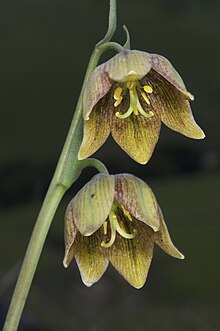Fritillaria agrestis
| Fritillaria agrestis | |
|---|---|

| |
| Scientific classification | |
| Kingdom: | Plantae |
| Clade: | Tracheophytes |
| Clade: | Angiosperms |
| Clade: | Monocots |
| Order: | Liliales |
| Family: | Liliaceae |
| Subfamily: | Lilioideae |
| Tribe: | Lilieae |
| Genus: | Fritillaria |
| Species: | F. agrestis
|
| Binomial name | |
| Fritillaria agrestis | |
| Synonyms[1] | |
|
Fritillaria biflora var. agrestis Greene | |
Fritillaria agrestis is a species of fritillary known by the common name stinkbells. It is endemic to California, where it is found in scattered populations from Mendocino County and Butte County to Ventura County.[2] It grows in heavy soils, particularly clay. It is not common.[3]
Description
[edit]Fritillaria agrestis grows an erect stem reaching about half a meter in height with a clump of 5 to 12 long, narrow leaves clustered around its base. The nodding flower is a cup of six tepals, each one to three centimeters long and sometimes curved at the tips. They are white with greenish to pinkish markings on the outer surface and purple-brown on the inner surface. The nectaries inside the flower are long and prominent. The flower has an unpleasant odor.[4][5][6]
References
[edit]- ^ Tropicos
- ^ Biota of North America Program
- ^ Calflora taxon report Fritillaria agrestis E. Greene stinkbells
- ^ Flora of North America v 26 p 187, Fritillaria agrestis
- ^ Greene, Edward Lee. 1895. Erythea 3(4): 67–68.
- ^ Greene, Edward Lee. 1894. Manual of the Botany of the Region of San Francisco Bay 311, as Fritillaria biflora var. agrestis.
External links
[edit]- Jepson Manual Treatment
- United States Department of Agriculture Plants Profile
- Calphotos Photo gallery
